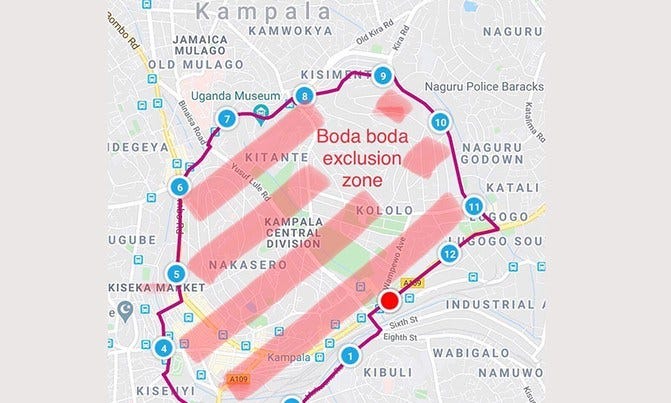Uganda’s capital, Kampala, is no longer going ahead with its proposed plans to remove boda bodas from the city’s center. Daniel Nuwabiine, Kampala Capital City Authority (KCCA) spokesperson has come forward to say that although the plan was necessary, it was hastily concluded without consultation with the relevant stakeholders. Consequently, the plans would be returning to the shelf for now.

“Engagements are ongoing. The major focus is on how we can achieve a sustainable transport system for the city without looking at only boda bodas but also other commercial vehicles in the city. We expect to have a comprehensive plan soon which will be unveiled to the public before its implementation starts,” Nuwabiine said in an interview.
“We have not abandoned the boda boda free zone corridor but it will only be implemented after we have come up with a comprehensive transport system for the entire city which is currently being worked on,” he added.

In any case, it appears the city may even abandon the plans entirely, as Nuwabiine also mentioned that the government is currently considering partnering with private companies to procure buses, claiming that shuttles can transport more passengers than boda bodas.
“One of the mistakes government does is to come up with some plans or policies for the transport sector without first engaging those who are directly involved in the transport business because we understand it more than any other person and we can actually give government information that they want regarding the boda boda industry,” the chairperson of the Kampala Bodaboda Association, Mr Kiviri Kanyike, said.
Attempting To Regulate Bike-Hailing In Kampala
In exactly the same fashion, the city of Kampala, Uganda’s capital, which is home to about 1.5 million people, last year attempted to do what Nigeria’s most populous city — Lagos — did to its famously known okadas back in February this year — the city’s government banned them from operating on its highways.
A widespread agitation against the directive banning commercial cyclists from accessing the Kampala city center and surrounding places, however, led to the suspension of the proposed ban.
“In light of the presentations, KCCA in consultation with other key government agencies has come up with a roadmap that will facilitate operation of the digital companies as well as streamlining public transport. The roadmap entails a validation exercise for digital companies and make recommendations to each for the city to achieve a harmonized transport system,” the directive read in part.
“Cabinet approved Boda Boda Free Zone where All Boda Bodas are prohibited from entering/accessing,” it further read.

All moves came after the Ugandan government, earlier in May this year, through the State Minister for Kampala, Kampala Lord Mayor Erias Lukwago, Kampala Capital City Authority (KCCA) and the Ministry of Works and Transport, issued unimplemented guidelines expressing its intentions to force all traditional commercial motorcyclists (locally more known as “boda boda”) to go digital or cease to exist. Mr Nuwabiine revealed that KCCA has since halted all the processes, pending a final resolution that will be made by stakeholders.
Kampala is Uganda’s largest city, population-wise (1.5 million), and by far ahead of cities like Gulu, Entebbe, Lira, Mbarara or Nansana which have a combination of not up to 1,000,000 people. (Note: only about 18 million Ugandans, representing about 40.1% of the population have access to the internet.)
The ban, in Lagos, on bike-hailing nevertheless still remains a deadly blow on ride-hailing startups in Nigeria. Lagos holds about 15.2% of Nigeria’s entire internet population (14,192,283 subscribers).
Charles Rapulu Udoh

Charles Rapulu Udoh is a Lagos-based lawyer who has advised startups across Africa on issues such as startup funding (Venture Capital, Debt financing, private equity, angel investing etc), taxation, strategies, etc. He also has special focus on the protection of business or brands’ intellectual property rights ( such as trademark, patent or design) across Africa and other foreign jurisdictions.
He is well versed on issues of ESG (sustainability), media and entertainment law, corporate finance and governance.
He is also an award-winning writer
